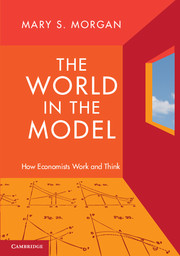Book contents
- Frontmatter
- Contents
- Figures, Tables, and Boxes
- Preface
- 1 Modelling as a Method of Enquiry
- 2 Model-Making: New Recipes, Ingredients, and Integration
- 3 Imagining and Imaging: Creating a New Model World
- 4 Character Making: Ideal Types, Idealization, and the Art of Caricature
- 5 Metaphors and Analogies: Choosing the World of the Model
- 6 Questions and Stories: Capturing the Heart of Matters
- 7 Model Experiments?
- 8 Simulation: Bringing a Microscope into Economics
- 9 Model Situations, Typical Cases, and Exemplary Narratives
- 10 From the World in the Model to the Model in the World
- Index
- Plate Section
- References
9 - Model Situations, Typical Cases, and Exemplary Narratives
Published online by Cambridge University Press: 05 November 2012
- Frontmatter
- Contents
- Figures, Tables, and Boxes
- Preface
- 1 Modelling as a Method of Enquiry
- 2 Model-Making: New Recipes, Ingredients, and Integration
- 3 Imagining and Imaging: Creating a New Model World
- 4 Character Making: Ideal Types, Idealization, and the Art of Caricature
- 5 Metaphors and Analogies: Choosing the World of the Model
- 6 Questions and Stories: Capturing the Heart of Matters
- 7 Model Experiments?
- 8 Simulation: Bringing a Microscope into Economics
- 9 Model Situations, Typical Cases, and Exemplary Narratives
- 10 From the World in the Model to the Model in the World
- Index
- Plate Section
- References
Summary
Introduction
The model that forms the heart of this chapter is the Prisoner’s Dilemma game, in which we find two thin model men making a strategic choice within a small model world. The characters are the rational economic men whose history we charted in Chapter 4, while the small world is one of those characteristically small and constrained model worlds like the Edgeworth Box (of Chapter 3) or the supply and demand model (of Chapter 7). In this chapter, the Prisoner’s Dilemma game shows how the thin man inhabits the small world in a way that epitomises modelling in modern economics.
The Prisoner’s Dilemma game is not just a standard working object in economics, but represents an important general problem in a shorthand way for economists. It is one of a number of simple ‘games’ studied in the social sciences that represent not just situations of conflict in which choices must be made, but situations in which the players face a dilemma in choosing what actions to take. But, significantly, the Prisoner’s Dilemma game also presents a dilemma for social scientists, particularly economists, studying the game, for the outcome of the rightly reasoned or ‘rational’ action by the individuals taken separately leads to an outcome that seems to be wrong or ‘irrational’ when the individuals are taken together, that is, for society. This combination of qualities has turned the Prisoner’s Dilemma game into an exemplary model not only for such situations in the economic world but also with respect to fundamental beliefs that economists hold about the economy.
- Type
- Chapter
- Information
- The World in the ModelHow Economists Work and Think, pp. 344 - 377Publisher: Cambridge University PressPrint publication year: 2012
References
- 1
- Cited by

